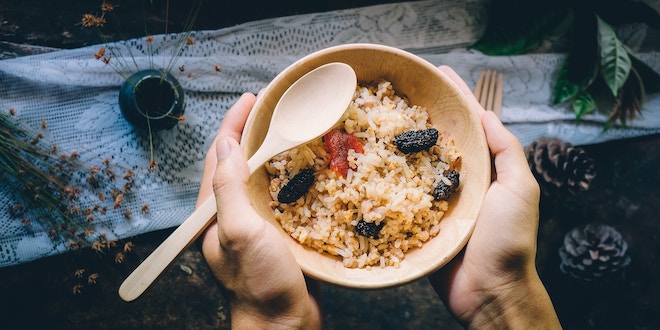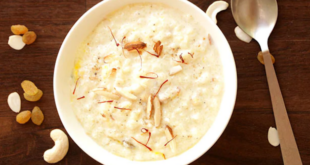Last Updated on October 19, 2023
Basmati rice has a unique aroma and flavour and originated from the Indian subcontinent. It is commonly found in many traditional Indian and Pakistani dishes, longer than most rice, and somewhat grainy. Like all other types of rice, basmati rice is brown or white, depending on its milling process. Basmati rice has a special nutritional composition that differs from other rice types and makes basmati rice ideal for health.
Basmati rice calories, vitamins and minerals
100g of basmati rice provide 353 kilocalories (kcal). The caloric intake of a food represents its energy value, that is to say, the amount of energy it provides to the body.
The protein, carbohydrate and lipid contents of basmati rice
Each 100g of this food contains 0.8g of lipids, 7.7g of proteins, and 77.8g of carbohydrates. Additionally, it has a water content of 12.4%.
Breakdown of the nutritional content found in Basmati Rice per 100g:
– Water: 12.4g
– Proteins: 7.67g
– Alcohol: N/A
– Carbohydrates: 77.8g
– Including sugars: 0.17g
– Starch: N/A
– Dietary fibre: 0.92g
– Lipids: 0.84g
– Saturated fats: 0.19g
– Monounsaturated fatty acids: 0.3g
– Polyunsaturated fatty acids: 0.23g
– Cholesterol: N/A
- Please note that these values are for informational purposes only and may vary depending on the rice’s specific brand and preparation method.
Vitamin Content of Basmati Rice:
– Vitamin A (retinol)
– Beta-carotene (provitamin A)
– Vitamin D (cholecalciferol)
– Vitamin E (tocopherol)
– Vitamin K1
– Vitamin K2
– Vitamin C
– Vitamin B1 (thiamine)
– Vitamin B2 (riboflavin)
– Vitamin B3 (niacin)
– Vitamin B5 (pathogenic acid)
– Vitamin B6
– Vitamin B9 (folic acid)
– Vitamin B12 (cobalamin)
Minerals Present In Basmati Rice:
– Calcium
– Copper
– Fe
– Iodine
– Magnesium
– Manganese
– Phosphorus
– Potassium
– Selenium
– Sodium
– Zinc
What about basmati rice Nutritional Value?
Basmati rice has a very high nutritional value, making it beneficial for health and diets. There are a large number of micronutrients and macronutrients in basmati rice, all of which serve important functions throughout the body.
A serving of basmati rice contains important minerals such as manganese, copper, calcium, zinc, potassium, selenium and magnesium. A single serving contains 21% of the recommended daily magnesium intake and 6% of the recommended daily iron intake.
Important vitamins in basmati rice include vitamin B1, B6, pantothenic acids, vitamin K, E and riboflavin. Basmati rice contains a small amount of protein, which is perfect for anyone following a plant-based diet, and it is also rich in good carbohydrates and a high amount of fibre.
All these vital nutrients are equivalent to a balanced diet and have extraordinary benefits for good health.
Basmati Rice Is Ideal For Diabetes and Weight Loss
If you’re a regular dieter, you must have heard to avoid rice altogether when dieting or suffering from the consequences.
Basmati rice is among those special circumstances, and brown basmati rice can be a staple in any diet, providing you with plenty of vitamins, minerals, and health benefits.
Since basmati rice has a different nutritional composition than other types of rice, it is safe and beneficial to consume for people who want to lose weight or have serious diseases like diabetes.
The sweet smell that differentiates basmati rice from other rice is due to the concentration of 2-acetyl-1-pyrroline (a compound that carries an aroma and flavour, giving their characteristic smell) 12 times higher than that of other rice.
Its very elevated nutritional value also sets it apart, making it a super grain. Basmati rice contains up to 20% more fibre than other types of rice.
Interesting Facts and Origins
Basmati rice comes from India and Pakistan, and they are the world’s main exporters of this special rice type.
The name basmati translates in Hinduism to “fragrant.” It is said to have been cultivated in the country for centuries, with the first documentation of rice being in 1766.
It became a huge part of cultural exchange, and Indian traders brought it to the Middle East. Since then, it has become a very important ingredient in Persian and Arabic cuisines.
The compound that creates the unique aroma of basmati rice, 2-acetyl-1-pyrroline, is quite commonly found in fruits and some grains.
Both the United Kingdom and the United States approved the compound, and it has since been used in many restaurants and bakeries to add a special flavour to their products.
For centuries, basmati rice has made its mark around the world and has been studied to do wonderful things to prevent disease and help with common problems such as constipation. Nowadays, it is used for multiple reasons other than a food or cooking ingredient.
Basmati Rice Has The Ability To Prevent The Formation Of Cancer Cells
It is not easy to find rice with the amount of fibre that basmati rice contains; it contains nearly 20% more fibre than brown rice found at the grocery store. Again, fibre is one of the greatest health benefits basmati rice has to offer, simply because it’s a nutrient we need in our daily lives. One of the outstanding benefits that fibre has brought to the body is its ability to prevent the formation of cancerous cells.
Many researchers believe fibre can protect against many forms of cancer, but colon cancer tops the list. That’s because fibre does most of its work in the colon, but there hasn’t been any research indicating that a high fibre intake won’t also help prevent other cancer cells.
One study showed that fibre passes quickly through the colon, meaning it can eliminate carcinogenic compounds. The same studies also showed that the more fibre you eat, the less you will have colon cancer or the formation of cancer cells.
Conclusions
This special variety of rice should be eaten more often than your traditional brand of rice. With its high nutritional value, the health benefits of basmati rice are almost endless. We think it’s safe to say that you should switch to Basmati rice.
It is safe for many diets, particularly a diabetic diet that relies on certain blood glucose-regulating compounds. It’s hard to find a diet-friendly type of rice or pasta, especially if you have diabetes or are trying to avoid it, but basmati rice is an exception.
Note that basmati rice cooks differently than other types of rice, so follow the appropriate instructions for best results.
 Travel for Food Hub The Food Blog for Travel Lovers
Travel for Food Hub The Food Blog for Travel Lovers
















